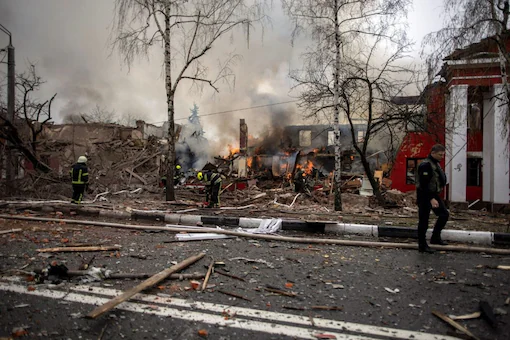
KYIV, Ukraine, May 26, 2022 (BSS/AFP) - Ukraine said Thursday the war in the
east of the country had hit its fiercest level yet as it urged Western allies
to match words with support against invading Russian forces.
Moscow's troops are pushing into the industrial Donbas region after failing
to take the capital Kyiv, closing in on several urban centres including the
strategically located Severodonetsk and Lysychansk.
Russian forces also shelled Ukraine's second city Kharkiv, killing four
people, after Moscow's efforts to capture the north-eastern hub were repelled
by heavy battles early in the war.
Britain and Germany both said Thursday that Russian President Vladimir Putin
must be defeated in the conflict, now in its fourth month, but Kyiv called on
the West to urgently supply more heavy weapons for its outgunned forces.
"The fighting has reached its maximum intensity," Ukraine's Deputy Defence
Minister Ganna Malyar told a press briefing about the battles in the east.
"Enemy forces are storming the positions of our troops simultaneously in
several directions. We have an extremely difficult and long stage of fighting
ahead of us."
Pro-Moscow separatist groups have controlled parts of Donbas, the industrial
basin comprising Donetsk and Lugansk regions, since 2014 but Russia now
appears set on taking the whole region.
Lugansk regional governor Sergiy Gaiday said that "heavy" Russian
bombardments on Lysychansk had done extensive damage to civilian
infrastructure, including a humanitarian aid centre.
- 'Show me one Nazi!' -
Three people died in recent Russian attacks on Severodonetsk and Lysychansk,
which stand on the crucial route to Ukraine's eastern administrative centre
in Kramatorsk, Gaiday said.
In Kramatorsk itself, children roamed the rubble left by Russian attacks as
the sound of shellfire booms.
"That was a 22 (122-mm artillery)," said Yevgen, a sombre-looking 13-year-old
who moved to Kramatorsk with his mother from the ruins of his village Galyna.
"I am not scared," he declared as he sat alone on a slab of a destroyed
apartment block. "I got used to the shelling."
Four civilians were killed in shelling in the Donetsk region around
Kramatorsk, the Ukrainian presidency said.
Fresh shelling around Kharkiv in the northeast killed another four people,
with officials warning residents to take to air raid shelters.
"The occupiers are again shelling the regional centre," the governor of the
Kharkiv region, Oleg Sinegubov, said on Telegram.
Russia's rationale of a "special military operation" to "demilitarise and de-
Nazify" Ukraine draws a snort of derision in one village near Kharkiv.
"Show me one Nazi in the village! We have our nation, we are nationalists but
not Nazis nor fascists," says retired nurse Larysa Kosynets.
- 'Putin must not win' -
As the toll mounted, Ukrainian President Volodymyr Zelensky called on the
West to add to the billions of dollars in weaponry it has already poured in,
and blasted suggestions a negotiated peace could include territorial
concessions.
"We need the help of our partners -- above all, weapons for Ukraine. Full
help, without exceptions, without limits, enough to win," Zelensky said in
his daily address to the nation.
Ukrainian Foreign Minister Dmytro Kuleba had earlier told Davos that his
country "badly" needs multiple-launch rocket systems to match Russian
firepower.
German Chancellor Olaf Scholz, who has faced criticism over Berlin's slow
response, underscored the "resolve and strength" of the West.
"Our goal is crystal clear -- Putin must not win this war. And I am convinced
that he will not win it," the German chancellor told the World Economic Forum
in Davos.
Scholz added that it was a "matter of making it clear to Putin that there
will be no dictated peace."
British Foreign Secretary Liz Truss echoed the German chancellor's comments
and warned against offering "compromise or appeasement" to Putin.
"We need to make sure that Putin loses in Ukraine and that Ukraine prevails,"
Truss told reporters during a visit to Sarajevo, saying that Kyiv needed to
be supported without "backsliding".
- 'Illegal' sanctions -
The Ukraine conflict has sparked fears of a global food crisis, on top of the
political and economic shockwaves that have already reverberated around the
world since the February 24 invasion.
The Kremlin on Thursday accused Western countries of stopping grain-carrying
vessels from leaving ports in Ukraine, rejecting accusations that Russia was
to blame.
"We accuse Western countries of taking a number of illegal actions that have
led to this blockade," Kremlin spokesman Dmitry Peskov told reporters
Russian Foreign Minister Sergei Lavrov meanwhile poured cold water on an
Italian peace plan to end the war.
The Russian central bank cut its key interest rate to 11 percent from 14
percent following an emergency meeting, as authorities sought to rein in the
ruble which has surged in value despite the conflict.
Moscow slapped strict capital controls to boost the economy after the
imposition of the sanctions and since then the ruble has staged a spectacular
rebound -- but Russia fears a strong ruble can hit budget revenues and
exporters.
The Kremlin is also seeking to tighten its grip over the parts of Ukraine it
occupies, including fast-tracking citizenship for residents of two southern
regions that are mostly under Russian control.
The United States branded the plan an "attempt to subjugate the people of
Ukraine".